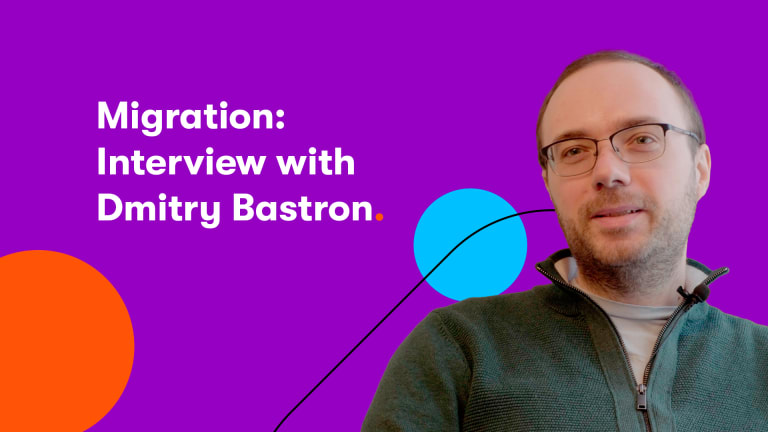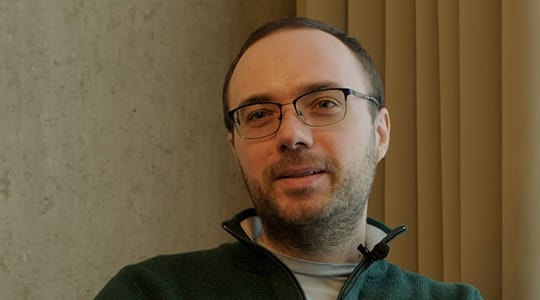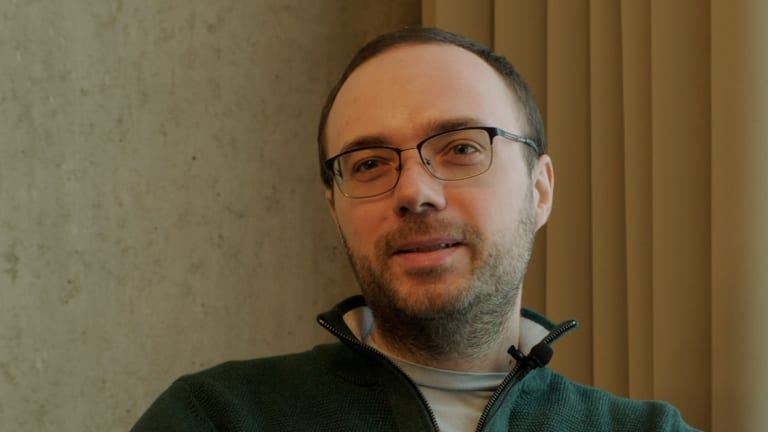Dmitry Bastron is one of our MVPs and the solutions architect of our partner ByteMinds. “Coding is boring,” he said—a bold statement from a man whose career revolves around technical architecture and CMS migrations. But Dmitry’s passion isn’t in the mundane tasks; it’s in solving tough problems, refining processes, and mentoring others.
When I told Dmitry I’d be rewriting this interview with ChatGPT, he had a good laugh. I use AI daily, not just to improve productivity but to explore ideas and reimagine workflows. It got me wondering: does Dmitry feel the same way about AI?
Masterchef coding show
Do you use AI a lot in your job?
I haven’t been an active developer for more than five years now. I still review and write code when needed, but honestly, I don’t find coding itself very exciting anymore. For me, the fun lies in exploring problems, finding solutions, and helping others improve their skills. It’s a bit like being a football manager—I know how things should be done, but I’m not the one running around the field anymore. I do think AI tools can be helpful, but I see them more as assistants. They can improve productivity and handle repetitive tasks, but creativity and problem-solving still comes from people.
Did you always plan to study computer science, or was it something you discovered later?
Not at all! As a kid, I loved solving math and physics problems, but my real passion was cooking. I wanted to be a chef. My parents, however, guided me toward IT. It wasn’t entirely a bad thing—they both worked in IT, so I had a strong influence at home. I even ended up having some of the same professors they did at university! And like my parents, I also met my wife at university. We were both studying computer science. So, while it wasn’t my childhood dream, it turned out to be a great decision.
If cooking was your passion, do you ever think you might open a restaurant someday?
Who knows? It’s not completely out of the question. A few months ago, my wife gave me an online sourdough baking course as a gift, and I’ve been hooked ever since. I’ve baked about 10 different types of sourdough bread in the last couple of months. Cooking and baking are great ways to unwind. It’s like coding in some ways—you start with a clear plan, adjust as needed, and end up with something creative and satisfying. Maybe one day I’ll combine my two passions: tech and food.
You mentioned your job is a bit like being a football manager. What’s your team?
I’ve supported Bayern Munich for almost 24 years now. I’m not sure why I chose them—maybe it’s my German roots. But watching Bundesliga back then, I just connected with them. Living in the UK gave me the chance to see Premier League games. I’m a Liverpool fan there. These days, I also enjoy smaller, local matches in Montenegro. For example, during a trip to Berlin, I watched Union Berlin play Borussia Dortmund. Smaller clubs often have so much heart and soul—it’s a unique experience.

“A few months ago, my wife gave me an online sourdough baking course as a gift, and I’ve been hooked ever since. I’ve baked about 10 different types of sourdough bread in the last couple of months.”
The migration expert
In your article, "Your Last Migration to Xperience by Kentico," you used a great analogy about moving houses. Can you elaborate on that?
Yes, I said I’ve moved houses and countries so many times that I consider myself a migration expert! When you move, it’s all about adaptability and planning. The first rule is: don’t panic. Start with a plan, but don’t be afraid to adjust as you go. When my wife and I moved to the UK, we arrived with just two suitcases. Two years later, we had 14 boxes and a fridge to move! It’s the same with CMS migrations—you need to prioritize, let go of what’s unnecessary, and focus on what truly matters. One of my favorite tips is to identify your “biggest building blocks.” What’s absolutely essential for the new environment? Once you have those, you can refine the smaller details.

What about migration
With Dmitry Bastron
Do you prefer migrations from competing platforms to Kentico or upgrades within Kentico?
Migrations from other platforms are definitely more exciting. They give me the chance to showcase Kentico’s strengths to new users, whether they’re coming from Sitecore or a headless CMS like Contentful. It’s always rewarding to help them see how Kentico can solve their challenges. Upgrades within Kentico are smoother, as users already know what to expect. But migrating from another platform is where I get to shine as a guide, introducing them to all the benefits of Kentico.
Speaking of competing platforms, fun fact: Your wife, Anna, is a Sitecore MVP. How does that rivalry play out at home?
Oh, we make jokes about it all the time! But honestly, it’s a healthy rivalry. Exploring multiple platforms helps us both grow. Every system has its strengths and weaknesses. I’ve learned a lot from Anna’s perspective, and it’s helped me bring ideas from other platforms back to Kentico as feedback. Of course, I’m still proud to say that Kentico outshines the competition in many areas!
You were also a Kontent specialist before Kentico’s split with Kontent. Do you still work with it?
Not as much these days, but my experience with Kontent and other headless CMS platforms like Contentful has been invaluable. When I first encountered headless CMS, it felt strange—there were no extra features like marketing automation or form submissions. But that’s by design, and once you understand it, you can see the beauty of simplicity. Working with Kontent helped me grasp concepts like modern content delivery and GraphQL, which are now essential for Kentico’s future.

Sitecore migration Demo
By Dmitry Bastron
From Budva with love
As a Kentico MVP, what excites you about the platform’s evolution?
A lot! Kentico’s faster release cycles and its focus on user feedback are huge advantages. One feature I’m really excited about is asset transformations, which will improve page performance and give us more flexibility in delivering fast, high-quality websites.
Kentico has also embraced a more modular, headless approach, which I think is the future. Listening to users and adapting quickly is what sets Kentico apart from many competitors.
Your sense of humor is often described as sharp. Do you ever exaggerate your Russian accent for laughs?
(Laughs) I don’t do it intentionally, but I’ve noticed that my accent often mimics the person I’m talking to. For example, when I worked with Italian teams, I started speaking English with an Italian accent! That said, my time in the UK definitely helped polish my pronunciation.
You’re originally from Russia but now live in Montenegro. How does living in Budva influence your work?
Montenegro is an incredible place. Living by the sea has always been a dream for my wife and me, and Budva gives us that perfect balance of beautiful beaches and nearby ski resorts. The peaceful environment here is great for focus and creativity. Plus, the friendliness of the local people and the sense of safety make it feel like home.

"When you move, it’s all about adaptability and planning. The first rule is: don’t panic. Start with a plan, but don’t be afraid to adjust as you go."
Dmitry, thank you for sharing your journey, humor, and insights with us. From football fields to CMS migrations, you’ve shown us how passion, adaptability, and a little bit of sourdough can lead to incredible things.
For anyone planning their own migration project, don’t forget to download the CMS Migration Checklist—a must-have for a smooth transition.

